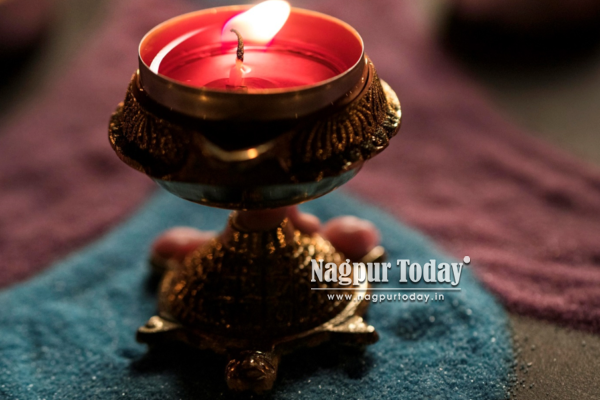
Lightning a diya is not just a ritual, but it has a deep spiritual meaning hidden in it. In Hinduism and other traditions, the act of lighting a diya conveys the message of dispelling darkness, sorrow and negativity. This invites divine blessings to enter your home and help you make the energy of the space even more spiritual.
However, this process is heavily influenced by the type of pooja oil you use in the lamp. Certain oils draw in beneficial vibrations while others repel negativity. The most commonly used are mustard oil, ghee, and sesame oil. They all have their own significance and benefits. Now, let’s understand which oil among them is most suitable for your pooja.
Why to Light a Diya?
It is auspicious to light a diya before starting any religious or significant event. Its flame signifies knowledge, and its glow is thought to bring prosperity, protection, and peace. As believed, one of the primary benefits of the vibrations we receive from a lighting a lamp is vastu protection, increased positive energies and peace. To get the most out of these benefits, make sure you choose the right oil.
Ghee – The Purest Choice
Ghee is a clarified form of butter and is the ‘sacred and spiritually soothing’ oil for pooja. But not all the ghee that we find in the market is pure. When it comes to the best ghee for pooja, ghee made from the milk of indigenous cows and prepared using the traditional Vedic method is the best.
- Spiritual Significance
- According to the Agni Purana, ghee lamps have the potential to purify the chakras.
- A pure cow ghee lamp is believed to keep negativity away from the surroundings while inviting positive vibrations.
- Ghee lamps are linked to Goddess Lakshmi and are believed to foster prosperity and abundance.
- Benefits
- It smulders with a slow flame, filling the space with a calm energy.
- It cleanses the air, removing toxins and negativity.
- It amplifies spiritual energy and is in harmony with traditional Vedic rituals.
Ghee is quite costly, but to ensure pooja is flawless, it is the optimum option due to its purity and spiritual value.
Sesame Oil – For Protection and Stability
Another great oil for lighting lamps is sesame oil. It is also called gingelly or til oil. For centuries, it has been used in Hindu rituals and is widely recognized for removing negativity.
- Spiritual Significance
- Sesame oil is considered sacred and is preferred for mantra japa and spiritual sadhana.
- Known to remove dosa and barriers, it is a powerful remedy for those dealing with a long-standing crisis.
- Lighting tip oil diya helps to suppress Saturn (Shani dosha) and leads to stability in life.
- Benefits
- It is cost-effective, lasts longer and is thus suited for long poojas.
- It cleanses the household from evil influences.
- It is a good substitute for people who can not purchase pure ghee.
- It is cheaper than ghee but a bit more expensive than mustard oil.
Mustard Oil – For Protection
The most commonly used oil, particularly in North India, for lighting lamps is mustard oil. It is affordable, readily available and serves as an ideal source for daily pooja.
- Spiritual Significance
- Mustard oil is associated with Goddess Kali and is used in temples where she is worshipped.
- It is said to cure Saturn-associated (Shani dosha) issues and help in defeating diseases.
- It assists in dispelling negative energies and safeguarding the establishment.
- Benefits
- It is very affordable and commonly used.
- It has a powerful scent that repels pests and negative vibrations.
- It produces clean fumes, although it can be smokier than ghee or sesame oil.
Mustard oil is the best, but it must be pure. So source the best quality mustard oil that is pure and unadulterated.
How to Prepare the Diya?
Diya offers its spiritual benefits only when preparation and lighting are done properly.
- Wipe Down the Lamp: Before putting oil in your lamp, wash and dry it.
- Cotton Wick: A cotton wick is a common type of wick; one end is placed in the oil while the other remains exposed.
- Fill with Oil: Use the oil you prefer, and make sure the wick is thoroughly soaked without being submerged.
- Light the Lamp: Light the wick and let the flame smoulder steadily.
Importance of Using the Right Oil While Performing Pooja
Choosing the right oil contributes to the ambience and allows more spirituality and devotion. Choosing the right oil can:
- Create peace, prosperity, & positive energy in the home.
- Eliminate negativity and blocks in life.
- It helps you come closer to divine energy.
Conclusion
Choosing the right lamp oil isn’t simply a habit; it affects your surroundings. Ghee is the purest and spiritually charged, sesame oil brings protection and stability, and mustard oil is the most materially and financially efficient. Each of the oils has its significance, and the best one to choose depends on personal preference, spiritual intentions, and budget. No matter whichever you pick, lighting a diya with devotion and sincerity will dispel darkness, sorrow and negativity.














